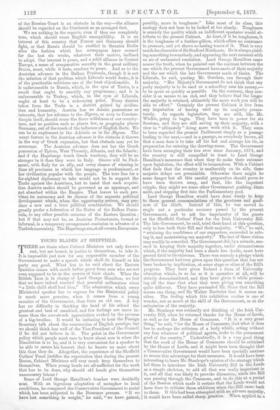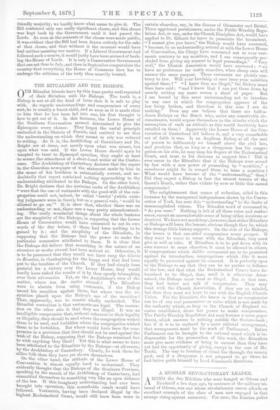YOUNG BLADES AT SHEFFIELD. T HERE are times when Cabinet Ministers
not only deserve rest, but are bound, in justice to themselves, to take it. It is impossible just now for any responsible member of the Government to make a speech which shall do himself or his party any good. What has to be said about the Eastern Question comes with much better grace from men who are not even supposed to be in the secrets of their chiefs. When the British Lion is in charge of Lord George Hamilton, we feel that we have indeed reached that peaceful millennium when "a little child shall lead him." The admiration which every Ministerial speaker has to express for the Ministerial policy is much more genuine, when it comes from a young member of the Government, than from an old one. A boy has no difficulty in thinking the head of his school the greatest and best of mankind, and few feelings are more in- tense than the awe-struck appreciation evoked by the prowess of a big-brother. It would be irritating to hear the Foreign Secretary talk about the resurrection of English prestige, but we should think less well of the Vice-President of the Council if he did not believe in it. The point in the Government policy which people most care to know about now is when the Dissolution is to be, and it is very convenient for a speaker to be able to assure his hearers that he knows no more about this than they do. Altogether, the experience of the Sheffield Cutlers' Feast justifies the expectation that during the present Recess, Cabinet Ministers will very much keep themselves to themselves. When young heads are all-sufficient for the work that has to be done, why should old heads give themselves unnecessary labour ?
Some of Lord George Hamilton's touches were decidedly neat. With an ingenious adaptation of metaphor to local conditions, he compared the Conservative Government to metal which has been subjected to the Bessemer process. "If we hava lost something in weight," he said, "we have gained, possibly, more in toughness." Like most of its class, this analogy does not bear to be looked at too closely. Toughness is scarcely the quality which an indifferent spectator would at- tribute to the present Cabinet. At least, if it be toughness, it is the toughness of a feather-pillow, which offers no resistance to pressure, and yet shows no lasting traces of it. That is very much the character of Sir Stafford Northcote. He is always yield- ing something to somebody, and appearing the next moment with an air of undaunted resolution. Lord George Hamilton came nearer the truth, when he pointed out the contrast between the use which the present Government have made of their majority and the use which the late Government made of theirs. The Liberals, he said, quoting Mr. Goschen, ran through their majority. "Her Majesty's Government do not think that any party majority is to be used as a schoolboy uses his money,— to be spent as quickly as possible. On the contrary, they con- sider it as means to an end, and they believe that the longer the majority is retained, ultimately the more work you will be able to effect." Certainly the present Cabinet is free from any imputation of having used up its majority prema- turely. As regards legislation, they are still, like Mr. Winkle, going to begin. They have been in power for six Sessions, and they are still saving up their majority, with a view to " ultimately " doing more work with it. They seem to have regarded the present Parliament simply as a passage leading to the next,—and in a passage, as everybody knows, all that a man does is to take off his hat and arrange his tie, in preparation for entering the drawing-room. The Government have been arranging their ties ever since January, 1874, and the country is still compelled to trust to Lord George Hamilton's assurance that when they do make their entrance upon legislation, the effect will be tremendous, With a Cabinet that feels that the country is unalterably on its aide, these majestic delays are permissible. Otherwise there might be some danger lest all this careful preparation should prove to have been thrown away, and that, like the impotent cripple, they might see some other Government pushing the= aside, and stepping first into the Parliamentary pool. Lord George Hamilton would have done wisely to keep to these general commendations of the greatness and good- ness of his chiefs. Instead of this, he was moved to single out a particular measure passed by the present Government, and to ask the imprimatur of the guests at the Sheffield Cutlers' Feast for the Irish University. Bill. The late Government, he said, tried their hand at this question, only to lose both their Bill and their majority. "We," he said, "retaining the confidence of our supporters, succeeded in solv- ing it, and maintaining our majority." The last of these claims may readily be conceded. The Government did,by a miracle, suc- ceed in keeping their majority together, under circumstances which, if the majority had been a shade less docile, must have proved fatal to its existence. There was scarcely a pledge which the Government had ever given upon this question that has not been broken by implication, at some stage or other of the Bill's progress. They have given Ireland a form of University education which, in so far as it is operative at all, will be strictly denominational, and they have given it while protest- ing all the time that what they were giving was something quite different. They have persuaded Mr. Shaw that the Bill means one thing, and Sir Walter Barttelot that it means an- other. The feeling which this exhibition excites is one of wonder, not so much at the skill of the Government, as at the submission of the majority. Mr. Stanhope was evidently not thinking of the Irish Uni- versity Bill, when he returned thanks for the House of Lords, as well as for the House of Commons, "It is a very great thing,' he said, "for the House of Commons, that what it does has to undergo the criticism of a body which, acting without any fear whatever of political agents, looks to the permanent good of the country." Undoubtedly, it is a very good thing that the work of the House of Commons should be criticised by the House of Lords, and it might have been thought that a Conservative Government would have been specially anxious to secure this advantage for their measures. It would have been interesting to learn Mr. Stanhope's opinion of the strategy which led them to introduce the Irish University Bill in the Lords as a simple skeleton, to add all that was really important .m it, and all that was likely to provoke discussion, while the Bill was passing through the Commons, and to do this at a period of the Session which made it certain that the Lords would not have time to criticise these additions when the Bill came back to them. If this had been attempted with an adverse majority, it would have been called sharp practice. When applied to a
friendly majority, we hardly know what name to give it. The Bill contained only one really significant clause, and this clause was kept back by the Government until it had passed the Lords. As soon as the contents of the clause were made public, it was evident that the Bill had been drawn entirely for the sake of that clause, and that without it the measure would have had neither meaning nor motive. If a Liberal Government had followed euch a course, it would justly have been accused of burk- ing the House of Lords. It is only a Conservative Government that can net thus in July, and then in September congratulate the country that everything the House of Commons does has to undergo the criticism of the body thus scurvily treated.































 Previous page
Previous page